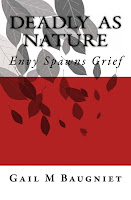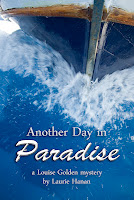Larissa considers herself lucky to have taught English in Japan, escaped a ferocious monkey in Thailand, studied archaeology in Egypt, and survived teaching high school history in the US.
FAST FIVE: Ohayo gozaimasu, Larissa. Irasshaimase. Rather
than the 140 characters we’ve grown accustomed to on Twitter, can you share
with us a more detailed account of the novel and your research for PORTRAIT OF A DEAD GUY?
LARISSA HOFFMAN REINHART: In tiny Halo, Georgia, everyone
knows Cherry Tucker. She’s small, fierce, and loud. She’s also a talented
artist. When the well-heeled Branson family wants to memorialize their murdered
son in a coffin portrait, Cherry scrambles to win their patronage from her
small town rival. Her rival wants to ruin Cherry’s reputation, and Cherry finds
someone is also setting her up for a fall.
In
a town where it seems impossible to have skeletons, Cherry finds some people
have more to hide than others. Particularly the victim’s stepbrother, Cherry’s
old flame, who is back in town after his stint in the army. He’s interested in
Cherry, but she can’t tell if his interest is sincere or a ruse to learn more
about the murder. Either way, she’s not eager to add more personal conflict in
her life. She has a flaky family, issues with a goat, and a sort-of ex-husband
she can’t shake. On top of this, she’s outraged to find an underground gambling
ring run by a recent immigrant in her hometown. Cherry seeks justice and to
clear her name while trying to get a portrait finished on time.
I
have an art history and art background, so I enjoyed the research on
portraiture and reacquainting myself with some of the art techniques. I grew up
in a small town, so much of that life is well known to me. Most of my research
was done on vehicles, goats, and guns. Which is pretty fun research, in my
opinion.
FAST FIVE: Your comments about the goats and Cherry's “sort-of ex-husband”
are sure to make any curious reader want to find out more about your protagonist. Is “the
job” the most important part of your protagonist’s life?
LARISSA HOFFMAN REINHART: Cherry Tucker’s creativity is
an essential part of her personality and that’s what makes her a good artist.
She’s also ornery, stubborn, and a smart mouth. Combine that with a tenacious
loyalty toward her family and hometown. However, her sense of duty and need for
justice melds with this tangential creative thinking and sometimes outweighs
common sense. Like thinking she can outsmart a killer.
FAST FIVE: The Mystery/Suspense genre is the focus of Fast
Five interviews, but what unique twist makes your novel stand out?
LARISSA HOFFMAN REINHART:I believe readers would say the
humor and the language makes this mystery stand out. I’m a character driven
writer. I enjoy taking the plot down interesting roads, but I gain the most
pleasure in creating memorable characters and putting them in odd
circumstances. And the characters are Southern, so some readers would say they
talk a little funny.
FAST FIVE: How does your main character’s profession draw her
into suspenseful situations, (murder, for instance?)
LARISSA HOFFMAN REINHART: Cherry Tucker is a portrait
artist, struggling to live on an artist’s income in her small, Southern
hometown. Her desperation drives her toward this odd portrait of a murdered man
and leads her closer to the killer in this story. Her artist profession brings
her into contact with a variety of people, but it’s her personality that gets
her involved in murder.
FAST FIVE: Is this book part of a series, and are you working
on a sequel?
LARISSA HOFFMAN REINHART: PORTRAIT OF A DEAD GUY is the first book in the Cherry Tucker
Mystery series. I have written the sequel and if all goes well it should be out
in the spring.
FAST FIVE: This isn’t a Fast Five question, more
an “if/then” scenario: If Paris is not an option, then where would you most
like to spend your time writing and why.
LARISSA HOFFMAN REINHART: Why isn’t Paris an option?
Paris should always be an option. Or are you suggesting you’re not footing the
bill to Paris? My laptop travels well. And I write better without internet
access. So Paris sounds pretty good. Or my local coffee shop, which does not
have wireless access. We used to live in Japan which also does not have a lot
of wireless hot spots. I got a lot of writing done there, too!
Thank
you for visiting today, Larissa, and having fun with the FAST FIVE questions. I agree that Paris should always be an option!
Where
readers can follow you:
I’m also on Pinterest under Larissa Reinhart and Cherry Tucker1 and Goodreads.
And my friends and I do a book chat every Wednesday on Facebook at www.facebook.com/LittleReadHens. Join us!





















